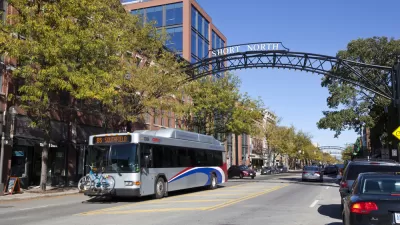Although cities are looking to technology to help them better connect to their residents, get them involved in decision making, and share data, Silicon Valley has been slow to catch on. Emily Badger looks at one company trying to change this.
Anyone who's walked the exhibition hall at a recent APA conference may quibble with Badger's assertion that, "there aren't many companies out there selling modern web services to cities." However, seeing a gap in knowledge and enthusiasm amongst investors and entrepreneurs, the San Francisco-based non-profit Code for America is taking following the lead of their neighbors in Silicon Valley by launching an accelerator for civic technology start-ups this summer.
The hope for the accelerator, which has received funding from Google and the Ewing Marion Kauffman Foundation, is "that this new industry can change the way you interact with local government in the same way that earlier tech start-ups have changed what's possible on the Internet."
"Our goals in thinking about this aren't in the one or two-year time
frame," says Abhi Nemani, Code for America's director of strategy and communications. "We're going to probably see some cool companies
come out of the first class. But this really is about a five to ten year
goal getting investors excited, getting entrepreneurs excited, getting
cities excited, getting this whole thing to work the way other markets
work."
FULL STORY: The Next Big Start-Up Wave: Civic Technology

Planetizen Federal Action Tracker
A weekly monitor of how Trump’s orders and actions are impacting planners and planning in America.

Restaurant Patios Were a Pandemic Win — Why Were They so Hard to Keep?
Social distancing requirements and changes in travel patterns prompted cities to pilot new uses for street and sidewalk space. Then it got complicated.

Map: Where Senate Republicans Want to Sell Your Public Lands
For public land advocates, the Senate Republicans’ proposal to sell millions of acres of public land in the West is “the biggest fight of their careers.”

Maui's Vacation Rental Debate Turns Ugly
Verbal attacks, misinformation campaigns and fistfights plague a high-stakes debate to convert thousands of vacation rentals into long-term housing.

San Francisco Suspends Traffic Calming Amidst Record Deaths
Citing “a challenging fiscal landscape,” the city will cease the program on the heels of 42 traffic deaths, including 24 pedestrians.

California Homeless Arrests, Citations Spike After Ruling
An investigation reveals that anti-homeless actions increased up to 500% after Grants Pass v. Johnson — even in cities claiming no policy change.
Urban Design for Planners 1: Software Tools
This six-course series explores essential urban design concepts using open source software and equips planners with the tools they need to participate fully in the urban design process.
Planning for Universal Design
Learn the tools for implementing Universal Design in planning regulations.
Heyer Gruel & Associates PA
JM Goldson LLC
Custer County Colorado
City of Camden Redevelopment Agency
City of Astoria
Transportation Research & Education Center (TREC) at Portland State University
Camden Redevelopment Agency
City of Claremont
Municipality of Princeton (NJ)





























